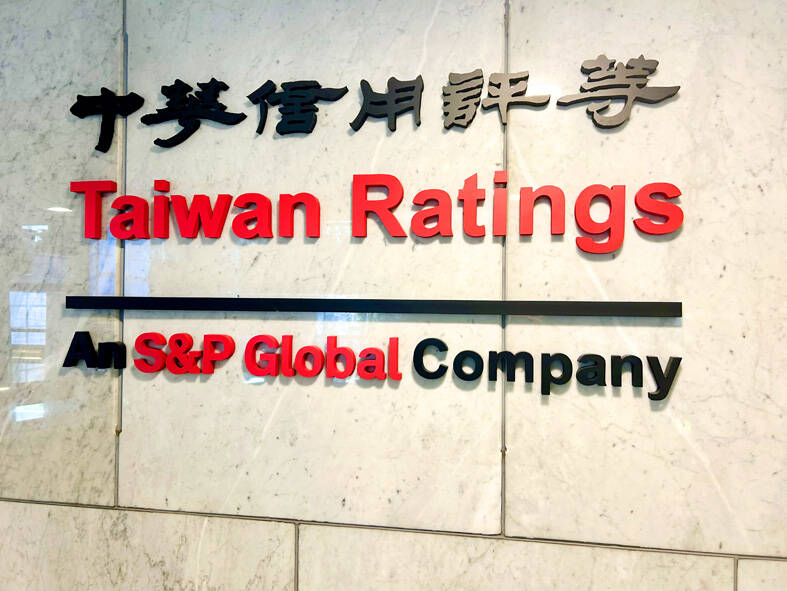Taiwan Ratings Corp (中華信評) has raised its forecast for Taiwan’s economic growth next year from 2.1 percent to 2.4 percent, as strong demand for artificial intelligence (AI) products would provide a solid buffer against potential challenges.
“Strong and rising demand for AI-related devices will continue to propel Taiwan’s economy over the next year,” Taiwan Ratings corporate credit analyst Raymond Hsu (許智清) told a media briefing in Taipei yesterday.
Similar reasons also prompted the agency to increase its growth projection for this year from 4.2 percent to 4.4 percent.

Photo: Wu Hsin-tien, Taipei Times
Hsu said the revisions assume a scenario where US president-elect Donald Trump would not impose additional tariffs on Taiwanese goods after he takes office next month.
Trump has pledged to tighten tariffs on goods from Canada, Mexico and China, and he earlier said Taiwan should pay higher tariffs for stealing the US’ chip business.
The specter of unfavorable trading terms, as well as lingering geopolitical tensions and restrictive interest rates, would constrain economies with heavy dependence on exports such as Taiwan, Hong Kong, Singapore and South Korea, Taiwan Ratings said.
Local tech firms on the AI supply chain would fare better as they command leadership positions in technology processes, Hsu said.
Global technology giants have indicated plans to step up budgets in AI development and investment, a positive trend that would help offset an expected economic slowdown in China, the largest destination for Taiwanese exports, Taiwan Ratings said.
China’s consumer confidence remains slack, despite stimulus measures and Washington’s extra tariffs, if true, would attenuate its effort to come out of the woods, Hsu said.
The ratings agency is looking at tariff hikes from 19.3 percent currently to 25 percent after Trump’s inauguration, limiting China’s GDP growth to 4.1 percent next year, from 4.8 percent this year, he said.
Not all Taiwanese tech firms would evenly benefit from the AI fever. Demand for electronics used in AI equipment and cloud computing is strong, but that for consumer electronics and vehicles would underperform, due to a lack of breakthrough applications and sharpening competition, Hsu said.
As for non-tech sectors, the landscape appears dim going forward, Taiwan Ratings said.
Local makers of cement, base metal and mass commodity products would likely have to grapple with a persistent capacity glut and price cuts, with the Chinese market weighed down by trade disputes with the US, Hsu said.

Sweeping policy changes under US Secretary of Health and Human Services Robert F. Kennedy Jr are having a chilling effect on vaccine makers as anti-vaccine rhetoric has turned into concrete changes in inoculation schedules and recommendations, investors and executives said. The administration of US President Donald Trump has in the past year upended vaccine recommendations, with the country last month ending its longstanding guidance that all children receive inoculations against flu, hepatitis A and other diseases. The unprecedented changes have led to diminished vaccine usage, hurt the investment case for some biotechs, and created a drag that would likely dent revenues and

Macronix International Co (旺宏), the world’s biggest NOR flash memory supplier, yesterday said it would spend NT$22 billion (US$699.1 million) on capacity expansion this year to increase its production of mid-to-low-density memory chips as the world’s major memorychip suppliers are phasing out the market. The company said its planned capital expenditures are about 11 times higher than the NT$1.8 billion it spent on new facilities and equipment last year. A majority of this year’s outlay would be allocated to step up capacity of multi-level cell (MLC) NAND flash memory chips, which are used in embedded multimedia cards (eMMC), a managed

CULPRITS: Factors that affected the slip included falling global crude oil prices, wait-and-see consumer attitudes due to US tariffs and a different Lunar New Year holiday schedule Taiwan’s retail sales ended a nine-year growth streak last year, slipping 0.2 percent from a year earlier as uncertainty over US tariff policies affected demand for durable goods, data released on Friday by the Ministry of Economic Affairs showed. Last year’s retail sales totaled NT$4.84 trillion (US$153.27 billion), down about NT$9.5 billion, or 0.2 percent, from 2024. Despite the decline, the figure was still the second-highest annual sales total on record. Ministry statistics department deputy head Chen Yu-fang (陳玉芳) said sales of cars, motorcycles and related products, which accounted for 17.4 percent of total retail rales last year, fell NT$68.1 billion, or

In the wake of strong global demand for AI applications, Taiwan’s export-oriented economy accelerated with the composite index of economic indicators flashing the first “red” light in December for one year, indicating the economy is in booming mode, the National Development Council (NDC) said yesterday. Moreover, the index of leading indicators, which gauges the potential state of the economy over the next six months, also moved higher in December amid growing optimism over the outlook, the NDC said. In December, the index of economic indicators rose one point from a month earlier to 38, at the lower end of the “red” light.